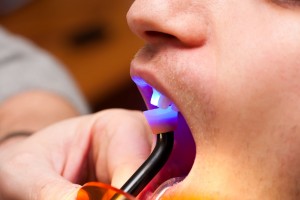Dental Bonding in Clarksville, Tennessee
If you need an easy way to repair a tiny flaw in your teeth, then dental bonding is the way to go. Think of dental bonding as a light alternative to a crown or a veneer. This procedure is fast, strong and works extremely well in situations where minor dental repair is needed.
Over time, even those who take great care of their teeth can experience cosmetic challenges with the overall presentation of their smile. Despite visits to the dentist for your routine cleanings and repairs, you may run into some issues with your teeth including discoloration, chipping, or other minor imperfections. At David Bailey, DDS, can help you keep your smile perfect.
What Does Bonding Do?
Teeth are composed of both enamel and dentin. Enamel is the outer area of the tooth that is visible. Enamel can be replaced by dental porcelain. Dentin is the inner part of the tooth and can also be easily replaced by resin and filler that can replicate the look of real enamel and dentin composition.
How Does Dental Bonding Work?
Dental bonding works simply by bonding tooth-colored resin to your teeth to cover any flaws, discolorations, chips, or imperfections. It is also applied to cavities to fill any holes and to make them look the same as your teeth. For the most part, the bonding treatment is permanent but may need to be repaired or replaced in the future.
What Can Dental Bonding Repair?
Patients may seek out dental bonding to repair all kinds of imperfections such as:
- An unprotected tooth root
- Chips and cracks
- Gaps between teeth
- Decayed teeth
- Holes left by cavities
- Undesirable tooth shape
- Small, unattractive teeth
Who is a Candidate for Bonding?
Dental bonding may not be a solution for everyone. You would have to consult with your dentist to see if it’s the right option for you. When you visit us for a bonding procedure, Dr. David Bailey will examine the tooth or teeth you have concerns about and will make an assessment if dental bonding can treat the problem.
Bonding won’t work for teeth that are worn down from biting, grinding, chewing, or other damage. It’s also not usually the best option for extensive areas of decayed teeth.
Bonding usually works well for small imperfections, and it is the most affordable and fastest option to fix your smile from any flaws that may otherwise take away from your teeth looking their best. For more serious damage, your dentist may recommend the option of a crown or veneer.
The Dental Bonding Procedure
The dental bonding procedure operates in the following way:
- An examination of your teeth is conducted, and your dentist will decide the right shade of resin that matches the area of your teeth that is being repaired.
- The tooth will then be prepared for application of the bonding resin. In most cases, anesthesia is not required. However, if you have a cavity filled it may be necessary to have anesthesia administered.
- Your dentist will mold and smooth the material to make sure it matches perfectly to your other teeth. It is important that the bonding look as natural as possible and match the surrounding teeth.
- Everything will be applied and molded to complete the look.
- Once everything is in place, and your dentist feels the resin shade and mold are right, a light will be used to harden the resin.

- Once all the resin is hardened and bonded to the tooth underneath, there may be some trimming or shaping needed to make everything appear right and natural looking.
- The process takes about 30 to 60 minutes for each tooth that needs treatment. A dental bond can last anywhere from 3 to 10 years.
- Your teeth should feel completely normal afterward, and there is no procedural downtime or pain during or after the process.
After Your Procedure
Practicing good oral health after your dental bonding is all that is required. Regular flossing and brushing two times a day is important as well as visiting your dentist for routine cleanings and exams. Your dentist will check the dental bonding on your teeth during your routine appointments to make sure it is in good condition. If any problem with the bonding arises, your dentist will explain if a touch-up or a replacement is in order. If you happen to notice that your bonding appears weak or is not in great condition, you should see your dentist as soon as possible.
Call our friendly staff today to learn more about dental bonding services in Clarksville, Tennessee.


